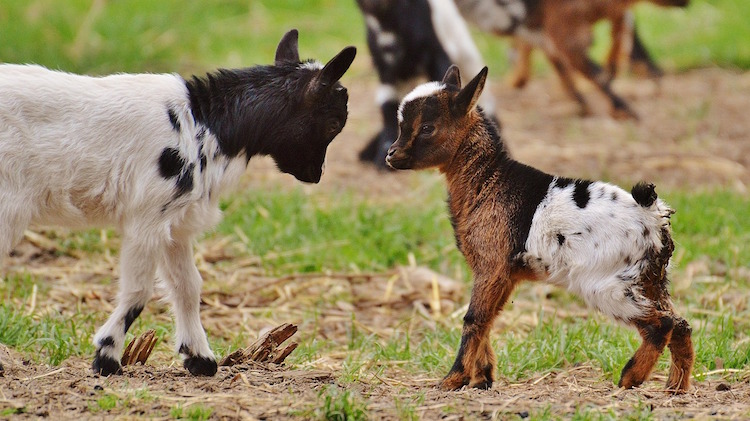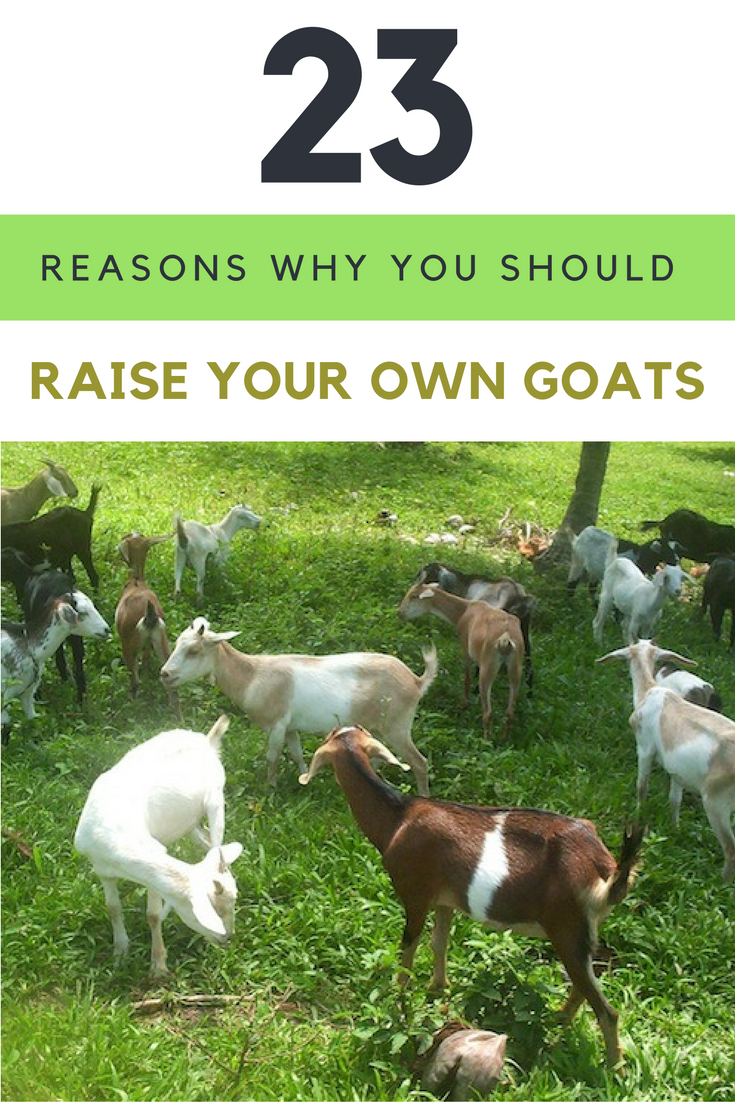
[adinserter block=”1″]
Keeping goats can help you create an overall healthier and happier lifestyle for you and your family. Goats are smart, cute, hard-working and playful. Before you start, you’ll want to check your city ordinances to be sure you can have goats within the city limits and if there are size limits.
For instance, if your city does allow goats, there are probably weight and size limits. You can see why many people opt for the small goat breeds, especially in more urban areas.
[adinserter block=”4″]

1. Goats are versatile.
They can provide milk and food, they are industrious, and they are personable. A well-trained goat can be just as loyal, sweet, and fun as a dog.
2. Goats have commercial uses.
Including providing mohair and cashmere, meat (from certain types like the Spanish goat and Boer goat), and milk products. Although goats used for hair and meat can be milked, butchered, or used as a pack animal, most homestead goats are used for dairy.
3. Goat’s milk has smaller, less dense fat globules.
When compared to cow’s milk, making it easier for humans to digest. Goat milk contains about four percent butter fat, compared to a little more than three percent for (store-bought) cow’s milk. Most people who drinks goat’s milk, especially babies, will benefit from its unique composition.
4. Goats can tolerate more heat than other animals, such as cattle, sheep, or hogs.
When it’s warm, goats basically need shade and water. If they’re kept indoors, provide them ample ventilation. During winter, goats need shelter. In very warm climates, they can be kept in a lean-to. In cooler climates, you’ll want to provide a barn or shed.
[adinserter block=”2″]
5. Goats eat a little bit of everything, including grass.
Most have diets of leaves, weeds, bark, pine needles, and brush. A goat only needs water and a fortified salt block. The two basic types of feed are hay and grain (mostly hay).
A wether, or castrated male goat, dry doe, or buck can subsist on grass hay. Provide one flake of hay per adult goat, and feed them once in the morning and once at night.
6. Goats give milk, so you don’t have to go to the store.
They’re smaller than cows, and a goat, or even a few, will fare just fine in a large fenced-in yard. Goat milk is good for people with milk allergies or who are lactose intolerant. You will want to research how to take care of a dairy goat.
7. Goats are playful.
They can provide companionship, entertainment, and add levity to your home. Most people have no idea that goats are affectionate, loyal, intelligent, curious, not too unlike dogs.
8. Goats are strong.
A wether can be trained to pull small carts or carry packs from a caring and affectionate owner. Wethers require regular exercise, and they are a quick study.
By the time they are two years old, a wether can pull a cart or carry a full-sized pack. A healthy adult goat can carry 25 percent of its body weight.
So, instead of strapping a thirty-five to fifty pound backpack on your shoulders, the goat can do the work. Perhaps the best part is that a wether will pack for you and follow you as a dog would. Plus a wether feeds himself and provides pleasant company.
9. Goats provide security.
You can have a “watch goat,” that is, an animal that will bleat at all intruders. Be sure to check with your city ordinances and find out the policy on animals and pets. Some cities consider goats “livestock” not pets.
10. Goats provide cheese.
Goat cheese or “chevre” has a distinctive flavor. Its tangy taste and creamy texture make it ideal to spread on crackers or scoop up with vegetables.
Chevre can add flair and flavor to any meal–omelets, quiche, salads–where you would use any other type of cheese. And since goat cheese is made from goat’s milk, it’s more digestible.
11. Certain goat breeds provide wool.
The ideal goat to keep for fiber is a female or castrated male. You will want to keep your goat clean during the winter and annually harvest its fleece. These steps will ensure that you get the highest quality of and cleanest fiber.
12. Goats can supplement your income.
Depending on where you live and the viability of your local market, you can sell goat milk, goat cheese, and goat mohair or cashmere. In addition, you can purchase a goat that is specifically used for dairy production, and then breed and sell its offspring to others.
13. Goats are personable.
They become attached to their owners and love to play and act silly. If you hand feed them, they become fairly docile. But, remember, they are like Peter Pan, always acting like gleeful children.
14. Goats will keep your lawn weed-free.
Goats can eat weeds up to six-feet tall, including noxious weeds like poison oak and poison ivy. They also eat leaves, bark, pine needles, and all types of brush and herbs. You notice we did not include “grass:” goats do not work as lawnmowers.
15. Goats can help improve your compost pile.
Goat manure is an asset to your lawn, offering rich nutrients that help break down soil and boost its physical condition. You can use goat manure for anything from flowering plants to vegetables.
Perhaps, most importantly, goat manure is virtually odor free making it far less obnoxious than other types of animal waste.
16. Goats can help you become a better steward of the environment.
Goats eat less grass hay than cows, which means they produce less poop and less methane gas. The difference may seem nominal, but over time, we all reap from the benefits of small changes.
17. Goats can help you feel happier.
Goats are cute, funny, loving and loyal. Similar to other pets, goats tend to cheer us up when we’re blue and draw us out when we’re feeling withdrawn.
The small breeds, like pygmies, can even sit in your lap. Studies show petting an animal raises oxytocin (the love hormone) levels, and hanging with goats can lower your blood pressure.
18. Goats help promote sustainability and self-sufficiency.
Similar to people who keep chickens for eggs, you can keep goats to produce milk and cheese. These types of sustainable behaviors allow you to provide for yourself. As a bonus, you save money and increase your health from eating food you have grown.
19. Goats can save you money.
Although you’ll have some start-up costs from building fence, and creating shelter for the goats, once you’re set up, they’re pretty cost-effective.
You’ll no longer have to drive to the store to get organic milk and cheese. You’ll save money by having natural born land-clearers and makers of manure.
20. Goats will encourage you to get exercise through simple hard work.
Whether you’re building fence, taking care of your goats, milking, feeding, and cleaning the living areas, you will be working “like a farmer.” This means getting up early every day, inhaling fresh air outside, and burning calories.
21. Goats can grow your circle of friends.
Mentioning that you keep goats can kick off a great conversation with just about anyone. And you may also meet other goat keepers.
You can share stories, best practices, goat’s milk and cheese recipes, and perhaps, create a small goat-sitting exchange program between neighbors.
22. Goats can serve as a meat source.
Goat meat is growing in popularity in the US partly because it serves as a staple for several ethnic groups. “Chevon,” as it’s known, is lean and flavorful, and can be used as an alternative to other more fatty meats.
Raising goats for meat involves choosing a breed, securing housing and fencing, and finding people who will want to purchase the meat. Obviously, you will want to research how to feed and care for meat goats.
23. Goats are friendly with other animals.
Because they are considered “herd animals,” goats like to have friends. As a matter of fact, they actually prefer the company of others to being alone. So, don’t be shy with accumulating a few goats.
Best practices when raising goats
If you’re dipping your toe into the goat keeping pool, most sources suggest starting with a pregnant female, or doe. In this way, you’ll be able to witness birthing and raising baby goats, or kids.
And because the doe will be providing more than enough milk to feed her kids, you will have ample milk and cheese for your family and to sell. As you begin this new hobby, sources say the breed type is less important than the sex.
That being said, there are numerous breeds. Dairy goats usually produce significant amounts of milk all year long. The higher fat content in the milk makes for creamier and thicker milk products.
Goats bred for meat production are large and reproduce frequently. Obviously, the bigger the goat, the more meat you will get from it. When speaking of breeds, remember that some goat breeds are better for your specific goals.
If you do want to purchase a particular breed, sources recommend some of the following:
- pygmy (meat breeds)
- Spanish
- Boer
- Kiko
- Nigerian Dwarf (dairy breeds)
- alpine
- LaMancha
- Nubian
- Toggenburg
- pygora (smallest fiber breed)
Some goat keepers will puff up their chest and brag to you about the particular breed they are raising. (Not unlike dog lovers!) Try not to get sucked into the competitive ramblings of these people. All breeds are going to provide pluses and minuses. Some breeds will shine and some will be a miss.
Remember, sometimes it is the luck of the genetic draw. And similar to other animals, hybrids and crossbreeds can provide just as many benefits, food, manure, companionship, as a “purebred.” Be sure to research all you can before you purchase.
Most female goats come into heat in the fall. Gestation period of a goat is a little under six months. Be sure to check your local fair, 4H groups, and the local paper to find your goats.
Keeping goats is a huge responsibility, so you’ll want to be patient, inquisitive, and choosy. You also have every right to be sure the goats are being treated in an ethical manner according to your standards.
Basic needs.
You can maintain 12 goats on 40 acres with 15 tons of hay. If you wish to add protein for milk production, add in alfalfa and soy. Check local prices, since these will vary from region to region.
If you choose to keep goats, you will need to provide a shelter, vaccinations, veterinary care, a place for milking, a place for playing, and most importantly, strong and secure fencing. Goats are notorious escape artists.


